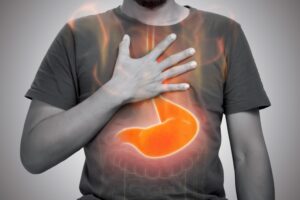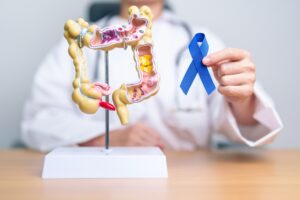
The Link Between GERD and Weight Gain
The connection between your weight and your reflux symptoms is a two-way street, with each one influencing the other.

Carbohydrates play a significant role in the development and management of IBS symptoms for many individuals. Certain types of carbs, especially those classified as fermentable oligosaccharides, disaccharides, monosaccharides, and polyols (FODMAPs), can be challenging to digest.
These poorly absorbed carbs may ferment in the gut, leading to symptoms such as bloating, gas, diarrhea, or constipation. Restricting high-FODMAP foods has been shown to alleviate IBS symptoms in some cases, making carbohydrate intake an important consideration for individuals managing the condition.
While low-carb and low-FODMAP diets may appear similar at first glance, they are designed with distinct purposes and mechanisms. A low-carb diet primarily reduces overall carbohydrate intake to support weight management, blood sugar control, or metabolic health. This diet typically limits carbohydrates in grains, starchy vegetables, and sugary foods but does not specifically target digestive symptoms.
On the other hand, a low-FODMAP diet emphasizes reducing specific types of fermentable carbohydrates that are poorly absorbed in the gut. This diet aims to minimize gastrointestinal discomfort and manage symptoms of disorders such as irritable bowel syndrome (IBS). Unlike a standard low-carb diet, low-FODMAP plans may still include carbohydrates that do not fall into the fermentable category, making the two approaches fundamentally different in intent and execution.
Reducing carbohydrate intake, particularly FODMAPs, has shown significant potential in alleviating the symptoms of irritable bowel syndrome (IBS). Limiting fermentable carbohydrates decreases the amount of gas produced in the gut, reducing bloating, abdominal pain, and irregular bowel movements. High-FODMAP foods, such as onions, garlic, and certain fruits, are known triggers for many IBS sufferers, causing discomfort when poorly digested.
Adopting a more controlled diet focusing on low-FODMAP options can create a more balanced digestive environment, improving symptom management. However, it is essential to approach such dietary changes under the guidance of a healthcare professional to ensure nutritional needs are met.
While low-carb diets are often promoted for weight loss and overall health, they can sometimes exacerbate IBS symptoms in certain individuals. Many low-carb diets heavily emphasize high-protein and high-fat foods, which can be difficult for some people with IBS to digest. Additionally, these diets often limit fiber-rich foods like whole grains, fruits, and vegetables, essential for supporting healthy gut function.
The lack of fiber can lead to constipation, a common symptom of IBS. Furthermore, some low-carb alternatives, such as artificial sweeteners and sugar alcohols, are high in FODMAPs and may trigger bloating and abdominal pain. It is crucial for individuals with IBS to carefully evaluate any dietary plan and adjust it to meet their unique digestive needs.
Consulting a dietitian or healthcare provider can help tailor a low-carb approach that supports overall health without compromising digestive comfort.
Fiber is vital in maintaining gut health, as it aids in regular bowel movements and supports a healthy gut microbiome. However, many low-carb diets often limit high-fiber foods such as whole grains, legumes, and certain fruits, creating a challenge for individuals trying to meet their fiber needs.
Insufficient fiber intake can exacerbate digestive issues, including constipation and discomfort, particularly for those with conditions like IBS. Incorporating low-carb, fiber-rich options such as non-starchy vegetables, chia seeds, and flaxseeds can help manage carb intake and promote digestive health. Understanding how to prioritize these choices ensures the gut remains nourished without compromising dietary goals.
For individuals managing IBS, not all carbohydrates are created equal. Good carbs, such as those found in low-FODMAP fruits like bananas, kiwi, and berries, and vegetables like zucchini or spinach, can provide essential nutrients without triggering flare-ups. These options are easily digestible for most people with IBS and deliver vitamins, minerals, and fiber critical for overall health.
Conversely, bad carbs, often high-FODMAP foods like onions, garlic, beans, and certain processed sugars, can cause bloating, gas, and discomfort in sensitive individuals. Identifying and focusing on good carbs while avoiding problematic ones is key to maintaining digestive balance and reducing IBS-related symptoms.
Every individual with IBS has unique triggers and tolerance levels, making personalized nutrition an essential approach to managing symptoms. Individuals can identify which foods work best for their digestive health by tracking food intake and associated reactions.
Consulting with a registered dietitian or nutritionist can further refine dietary plans, ensuring that nutrient needs are met while avoiding common triggers. Personalized nutrition helps alleviate IBS symptoms and empowers individuals to make informed and confident food choices tailored to their bodies.
It is important to consult your doctor if you experience persistent or severe symptoms that disrupt your daily life. Symptoms such as unexplained weight loss, blood in your stool, or recurring abdominal pain should be evaluated promptly to rule out other underlying conditions.
If over-the-counter remedies and dietary adjustments do not provide relief, a healthcare professional can help explore other treatment options, such as prescription medications or therapies. I’d like to point out that regular communication with your doctor ensures that your condition is properly managed and that any changes in symptoms are appropriately addressed. You can also consult the professionals at Allied Digestive Health. They can help diagnose and manage problems effectively, preventing them from worsening.

The connection between your weight and your reflux symptoms is a two-way street, with each one influencing the other.

A primary care doctor is an excellent starting point; finding a specialist who understands the complexities of IBS can be a game-changer.

Knowing what to expect can help ensure you are fully prepared for your colonoscopy, a critical tool in preventing colorectal cancer.

When a flare-up strikes, the natural instinct is to reach for pain relievers. But can these common medications help, or make things worse?

There’s a wide range of what’s considered normal, but “healthy” generally refers to consistency, ease, and frequency.

An IBS diagnosis in older adults can be more complex because the symptoms can mimic more serious conditions that become prevalent with age.

Antibiotics are powerful drugs designed to kill harmful bacteria, but they don’t always distinguish between good and bad microbes.

The goal is to check for signs of cancer or precancerous growths (polyps) in individuals who have no symptoms and are considered at average risk.

Early detection can identify precancerous polyps or cancer in its initial stages, significantly improving treatment outcomes.

When you’re under stress—whether from a demanding job, personal challenges, or even anxiety caused by IBS itself—it can trigger physical reactions in your body.

Maintaining awareness of hemorrhoid symptoms and consistent use of effective treatments can help prevent these long-term issues.

The connection between female sex hormones and IBS is complex but crucial to understanding why your symptoms fluctuate.
For Your Visit
Brick Office
P: 732-458-8300
Brick Medical Arts Building
1640 Route 88, Suite 202
Brick, New Jersey 08724
Mon – Fri: 8:30AM – 5:00PM
Sat & Sun: Closed
Neptune Office
P: 732-776-9300
Jersey Shore Medical Arts Building
1944 Corlies Ave. Suite 205
Neptune, New Jersey 07753
Mon – Fri: 8:30AM – 5:00PM
Sat & Sun: Closed
Jackson Office
P: 732-928-2300
706 Bennetts Mills Road
Jackson, New Jersey 08527
Mon – Fri: 8:30AM – 5:00PM
Sat & Sun: Closed
© All Rights Reserved